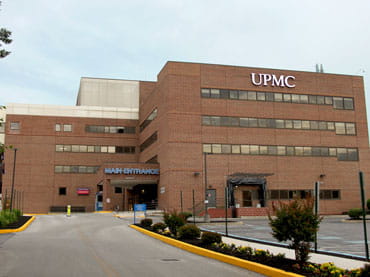Physical, occupational, and speech rehabilitation may be part of your recovery. These services are offered within UPMC Hanover on an inpatient basis only. (Modified barium swallowing studies are also available on an outpatient basis.)
Our Services
Physical and Occupational Therapy
Physical Therapy can help patients reduce pain and improve or restore mobility. It can also address prevention of injuries, as well as management of a variety of conditions. Occupational therapy promotes health and well-being by enabling people to develop, recover or maintain activities of daily living. Occupational therapists work with people of all ages who suffer from mentally, physically or developmentally disabling conditions. For patients in the hospital recovering from a surgery, injury, or illness, we offer:
- Neurological/Stroke Rehab – Post-CVA, TBI or other conditions of the central nervous system need specialized care.
- Orthopedic Therapy – Orthopedic Rehab encompasses post-operative knee, hip, shoulder, back and ankle deficits as well as a host of musculoskeletal problems.
- Post-Surgical Rehab
Speech Therapy
Modified barium swallow studies are available as both an inpatient and outpatient service.
This test allows the speech-language pathologist see: If food is going into the airway instead of the stomach (called aspiration), which parts of the mouth and throat may not be working well, what kinds of food are safest for the patient to swallow, and if certain positions or strategies help the patient swallow better. This test can also be done for babies and young children.
To schedule a modified barium swallow study, please call 717-230-3700.
What is a Modified Barium Swallow Study (MBSS)?
When you have a swallowing test in your hospital room, the speech language pathologist (SLP) can't see what is happening inside of your mouth and throat. The MBSS lets the SLP see:
- If food is going into your airway instead of your stomach, call aspiration.
- Which parts of your mouth and throat may not be working well.
- What kinds of food are safest for you to swallow.
- If certain positions or strategies help you swallow better
Babies and young children can also have this test done. Your SLP can tell you more about what to expect for your child.
What should I expect at my Modified Barium Swallow Study (MBSS)?
This study is done in the radiology, or x-ray department. You will meet the speech-language pathologist (SLP) there. There may also be a doctor there, called a radiologist. A radiology technician will be there to help you get ready and set up the equipment.
You will sit or stand next to an x-ray machine. Your SLP will give you different foods and drinks mixed with barium. The barium makes the food and liquid show up on the x-ray. Barium is not harmful and won't stay in your body for too long. The x-ray machine is only turned on while you swallow so you don't get too much radiation.
The SLP will ask you to do different things during the test. You may try soft foods and hard foods, and thin liquids and thick liquids. You may take small amounts and large amounts. You may be asked to move your head in different positions. You may also try things like swallowing hard. The test may be recorded so it can be watched again later.
If your child is having as MBSS, you may be asked to hold him/her in your lap. You will be given protection from x-rays, like lead vests and cover ups. You may feed your baby from a bottle if that is how he/she eats. Barium is not dangerous for babies or young children. You may see it in the baby's diaper for few days after the study.
You should not have this test done if you think you may be pregnant. It is not safe to have x-rays while pregnant.
What happens after the study?
Your speech-language pathologist (SLP) and doctor will talk about what they saw during the study. You and your family will be told the results. The SLP may show you the video of the test so you can see what happens yourself.
Your SLP will use the test results to decide what treatment will help your swallowing. You and the SLP will discuss what foods and liquids are safest, and how to eat them. You may start swallowing therapy soon after the study.

















